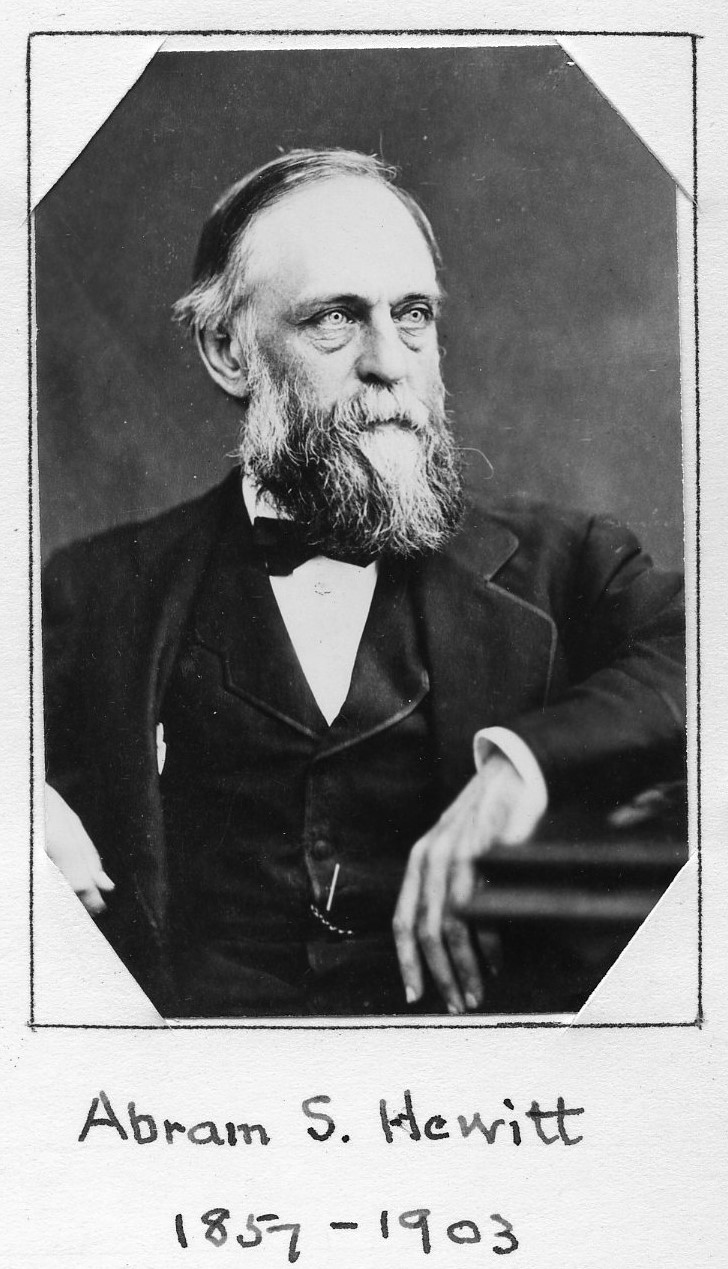Mayor of New York City/Iron Manufacturer
Centurion, 1857–1903
Born 31 July 1822 in Haverstraw, New York
Died 18 January 1903 in New York (Manhattan), New York
Buried Green-Wood Cemetery , Brooklyn, New York
, Brooklyn, New York
Proposed by William Kemble
Elected 7 February 1857 at age thirty-four
Archivist’s Note: Brother-in-law of Edward Cooper; father of Edward R. Hewitt and Peter Cooper Hewitt; grandfather of Norvin H. Green
Proposer of:
Seconder of:
- Frederick Billings
- Roswell D. Hitchcock
- Francis F. Marbury Jr.
- John E. Parsons
- George Foster Peabody
- David Wagstaff
Supporter of:
Century Memorial
The first name on the list of members of the Century dying within the year is that of the venerable Abram Stevens Hewitt, and his name also is among those earliest upon its roll, he having been elected nearly half a century since, in 1857. His was a striking figure. By vocation, from first to last, a student, restless, acute, untiring, broad in view, searching in inquiry, rapid in perception, gifted with the scientific imagination, born, one would say, for the closet and the laboratory, his actual avocations were extremely varied. Before he was thirty he had won from the public schools a scholarship in Columbia College, graduated at the head of his class, taught in that venerable institution, earned a year in Europe, and returning a shipwrecked traveller with three dollars in his pocket, had been admitted to the bar and had become a partner and son-in-law of Peter Cooper, then one of the leading business men of the country. The pace thus set in youth was kept up almost to the last. The greater part of his considerable fortune was made as an iron-master, and in the closing year of his life he said, with pardonable pride: “Let the record go down—every dollar that I own, without exception, is employed in giving occupation to men who are willing to work for a living.” It was one of the not few passions of his life to aid, by employment, by training, by counsel, those who were willing to work. He was himself not merely willing to work, but apparently driven to it in every direction. He gained a standing on the scientific side of metallurgy as high as on the business side—perhaps even higher. His report on “Iron and Steel,” as expert United States Commissioner to the Exposition Universelle at Paris, in 1867, and his address as President of the American Association of Mining Engineers, in 1876, on “A Century of Mining and Metallurgy in the United States,” commanded the highest respect abroad as well as at home, and showed the insight and the grasp of his mind as to his fascinating calling. Less technical and more philosophic was his remarkable review and forecast of the work of the construction engineer in his address on the opening of the Brooklyn Bridge in 1883. Meanwhile he was carrying on with eager energy the direction of Cooper Institute, the widely known scheme of Peter Cooper for the practical education of workers of each sex. For some fifty years he was the guiding mind in this most important and difficult enterprise, giving his money munificently and his time and labor and care almost without limit. He worked generously for his Alma Mater and was particularly interested in Barnard College. At the time of his death he was the President of the Carnegie Institution, and his active mind did much toward shaping the pursuit of its far-reaching purposes.
Mr. Hewitt was a member of Congress from 1874 to 1886, with the exception of one term, and in the latter year was elected Mayor of New York. He had a strong but enlightened—possibly a slightly whimsical—attachment for the Democratic party, though as to the principles he held to be essentially Democratic, he was most often quite at loggerheads with the controlling element of his party. His ideas of the tariff fitted ill with those of the majority led by Mr. Randall and were dead opposed to those of the majority led by Mr. Blaine[.] He entered Congress on the eve of the passage of the Specie Resumption Bill and just as the free-silver movement was assuming shape and strength, and he was in the thick of the fight for sound money and sound finance from first to last. To these two subjects he gave more time and labor than to any others, though he was very faithful and efficient in all the legitimate activities of a Representative and made his wide knowledge and keen intellect especially felt in connection with the diplomatic and scientific services of the Government. It was in these latter fields that he left, perhaps, the most distinct and lasting traces of his positive influence, not because his work upon the larger matters was less excellent—they demanded and received a higher degree and grade of effort—but as to them, and particularly as to sound finance, he may be said to have been in a minority of a minority and he had to contend as for his life against what Disraeli might have called the “brute vote” of the country. The contest was gallantly waged. As Mayor of New York, Mr. Hewitt did all that an upright and energetic man could do in one short term under a singularly confused and defective charter.
Admirable as was the record of Mr. Hewitt in public life, it hardly indicated his extreme charm in social intercourse, where his sensitive temperament was freed from the vexations that sometimes wrought havoc with his patience in the larger arena. Rarely quite ceasing to be a contestant, a soldier always, with whom to accept the slightest hint of challenge is a point of honor, he was among friends,
“Witty, courteous, liberal, full of spirit.”
Edward Cary
1904 Century Association Yearbook

